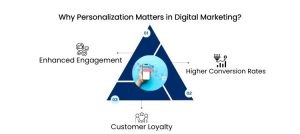to us to know how to promote business on the World Wide Web. We tell
them about different strategies that they can use different stages of their growth.
ContactUs
- +91-810-362-8856
- 106, Silver Arc Plaza, Janjeerwala Square, Indore – 452001, MP, India
-
Mon-Fri: 9am-8pm
Sat: 10am-6pm
Sun: Closed
Follow Us
The Power of Personalization: How to Tailor Your Digital Marketing Strategy in 2024
In 2024, the power of personalization in digital marketing is paramount. As consumers become more discerning and technology advances, brands must adapt by delivering highly tailored experiences. Personalization not only enhances customer engagement but also drives conversions and fosters loyalty. This blog delves into the significance of personalization, understanding your target audience, leveraging customer data, crafting personalized content, optimizing across channels, and measuring the impact of your efforts.
Why Personalization Matters in Digital Marketing?

Personalization is creating customized experiences for individual users based on their preferences, behaviors, and interactions. In 2024, personalization is more critical than ever due to the following reasons:
• Enhanced Engagement:
Personalized marketing content captures attention more effectively than generic messages. When consumers receive tailored recommendations or offers, they are more likely to engage with the brand.
• Higher Conversion Rates:
Relevant content and offers increase the likelihood of conversions. Personalized marketing strategies can lead to higher click-through rates, improved lead generation, and increased sales.
• Customer Loyalty:
Personalization fosters a deeper connection between the customer and the brand. By showing that you understand and value their preferences, you build trust and encourage repeat business.
Personalized marketing goes beyond just using a customer’s name in an email; it’s about delivering relevant, timely, and tailored content that addresses their specific needs and interests.
Understanding Your Target Audience
Effective personalization starts with a thorough understanding of your target audience. Here’s how to gain a comprehensive understanding of your audience:

• Demographic Insights:
Gather information about age, gender, location, and other demographic factors to segment your audience effectively.
• Behavioral Data:
Analyze customer behavior, including purchasing history, browsing patterns, and interaction with previous marketing campaigns.
• Preference Analysis:
Identify customer preferences and pain points through surveys, feedback forms, and social media interactions.
By segmenting your audience based on these insights, you can create more targeted and relevant marketing strategies. For instance, a retail brand might segment its audience into categories such as frequent buyers, seasonal shoppers, and new visitors, tailoring offers and content accordingly.
Leveraging Customer Data for Personalization
Customer data is the backbone of personalized marketing. To leverage data effectively:
• Data Collection:
Gather data from various touchpoints such as website interactions, email engagement, and social media activity.
• Data Management:
Use Customer Relationship Management (CRM) systems and Data Management Platforms (DMPs) to organize and analyze data.
• Privacy Compliance:
Ensure compliance with data protection regulations like GDPR and CCPA by obtaining explicit consent from customers before using their data.
Customer data allows you to build comprehensive profiles, which enable you to deliver personalized content and offers that resonate with individual users. For example, a customer who frequently browses fitness products might receive personalized recommendations for new workout gear or special promotions.
Crafting Personalized Content and Messaging
With insights from your audience and data analysis, you can craft content and messaging tailored to individual preferences:
• Dynamic Content:
Use dynamic content in emails and on your website to display product recommendations or offers based on a user’s past behavior and interests.
• Targeted Ads:
Create targeted ads on social media and search engines that align with users’ interests and browsing history.
• Personalized Web Experience:
Customize the website experience based on user behavior, showing relevant content and offers.
Personalized content increases engagement by addressing specific needs and interests. For example, if a user has shown interest in eco-friendly products, your emails and website could highlight sustainable product options and special discounts on eco-friendly items.
Optimizing Personalization Across Channels
Consistency in personalization across all digital marketing channels is crucial for a seamless user experience:
• Cross-Channel Tracking:
Implement cross-channel tracking to monitor user interactions across different platforms and devices.
• Integrated Approach:
Ensure personalized content and messaging are consistent across email, social media, websites, and mobile apps.
• Seamless Experience:
Provide a unified experience by aligning personalization efforts with the customer’s journey.
By optimizing personalization across channels, you ensure that users receive a cohesive and relevant experience, regardless of where they interact with your brand. For example, if a customer engages with your brand on social media, follow up with personalized email content that aligns with their social media interactions.
You may also like: How To Create A Social Media Promotion Strategy For Business?
Measuring the Impact of Personalized Digital Marketing
To evaluate the effectiveness of your personalized marketing efforts, track key performance indicators (KPIs):

• Click-Through Rates (CTR):
Measure how often users click on personalized content or offers compared to generic content.
• Conversion Rates:
Track the percentage of users who take a desired action, such as making a purchase or signing up for a newsletter, after receiving personalized content.
• Engagement Levels:
Analyze metrics like time spent on the site, pages viewed, and social media interactions to assess how well your personalized content is resonating.
• Customer Retention Rates:
Monitor how personalization impacts customer loyalty and repeat business.
Regularly review and analyze these metrics to refine your personalization strategy. A/B testing can help compare the effectiveness of personalized content against generic alternatives, allowing you to optimize your approach based on data-driven insights.
Conclusion:The Future of Personalized Digital Marketing
As we progress through 2024, personalization will continue to be a key driver of success in digital marketing. Brands that excel in delivering tailored experiences will stand out in a competitive landscape. Embracing advanced technologies such as artificial intelligence (AI) and machine learning (ML) will enhance your personalization efforts, allowing for even greater precision and relevance.
To thrive in the future of digital marketing, focus on understanding your audience, leveraging customer data, crafting personalized content, optimizing across channels, and measuring impact. By mastering the art of personalization, you’ll not only meet but exceed customer expectations, leading to stronger relationships and sustained success.
The future of digital marketing is personal, and those who embrace and excel in personalization will lead the way in creating exceptional customer experiences and achieving outstanding marketing results.
